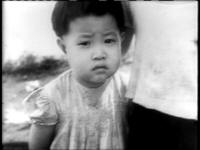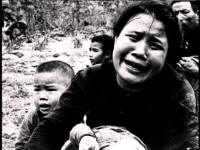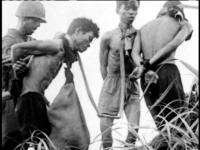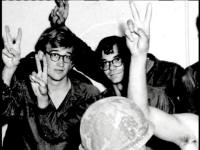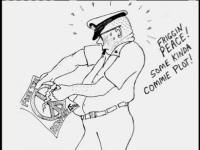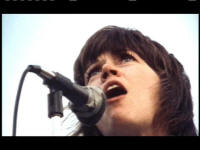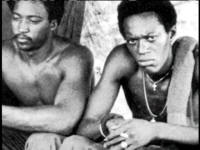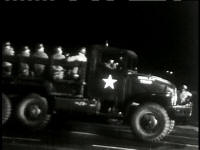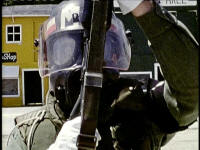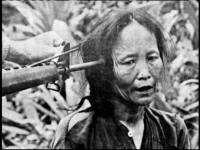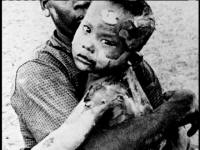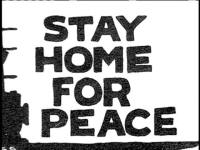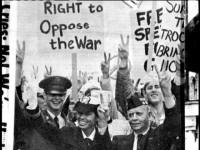|
Home SIR! NO SIR! -- SCREENPLAY |
|
|
A David Zeiger Film
SIR! NO SIR! --
Illustrated Screenplay & Screencap Gallery A DISPLACED FILMS
PRODUCTION RADIO FIRST TERMER: This film is in living color, and has been rated "X" by the Vietnam Academy of Maggots. This is Radio First Termer, operating on Dave Rabbit's own frequency at 69 megacycles on your FM dial. The purpose of this program is to bring vital news, information, and hard acid rock music to the First Termers and non-re-enlistees in the Republic of Vietnam. Radio First Termer operates under no Air Force regulations or manuals. In the event of a Vice-Squad raid, this program will automatically self-destruct. Soldier boy [ARMY SUCKS] ELDER HALIM GULLAHBEMI, U.S. ARMY: When I did go into the military, I went in there gung ho. In basic training, you have these 500 points that you score. I scored like 501 or something. I was really ready. BILL SHORT, U.S. ARMY: I was certain that every member of my family had their war, and that there would be a war for me. And I would go off and be a hero, and fight the good fight for this country. SUSAN SCHNALL, U.S. NAVY NURSE: I've tried to spend my whole life having people live a better life and basically feel better. That's what nurses do, right? DAVID CLINE, U.S. ARMY: It took us almost three weeks to cross the Pacific, and there wasn't too much to do on a troop ship. So we'd sit up on the deck at night and have raps. And a lot of times we'd get to what we were going to, whether it was right or wrong. And we'd go back and forth, back and forth. And we'd always end up concluding, well, let's hope we're doing the right thing, because that's where we're going. SIR! NARRATOR: In the early 1960s, the United States Government began sending combat troops to South Vietnam. DONALD DUNCAN, U.S. ARMY SPECIAL FORCES: I was really proud of what I thought I was doing. The problem I had was realizing that what I was doing was not good. I was doing it right, but I wasn't doing right. DR. HOWARD LEVY, DERMATOLOGIST, U.S. ARMY: I was asked to train Green Beret people, Special Forces men. Why were they training these guys in dermatology? Well, they were training them to do dermatology in Vietnam because they knew that if they were able to offer a few simple remedies, and help cure a few children of some simple bacterial infections, that that would ingratiate themselves to the Vietnamese community. And you remember the phrase, "Winning the hearts and minds of the people." So this was how you were going to win the hearts and minds of the people. And while they were offering the bandaids of helping to cure a few cases of impetigo, they were bombing the hell out of the villages. DONALD DUNCAN, U.S. ARMY SPECIAL FORCES: I was out on patrol near Hipwa, and we took a couple of prisoners -- I don't know whether they were combatants or not, who knows? The patrol was led by Americans, but there were Vietnamese ARVN there. And they were turned over to ARVN. And ARVN used the old-fashioned methods of interrogation: force, torture. That was pretty common practice. [ARVN = South Vietnamese Army - U.S.] I tell you, as bad as that treatment was, the cynicism that attached to it was the part that was really sickening, I thought, anathema to everything I'd been taught, everything I learned, everything I grew up with. This is just not the way we treated human beings. And it was all done for the good of the cause, I guess. [Ramparts -- "I quit!"] I got out of the military in 1966. I got out because of the things I saw, the things I was doing, and the reasons that we were given for doing them. ["The whole thing was a lie!" By Donald Duncan] It was a personal protest. It was just me getting out of the service. There was no Movement to join. DR. HOWARD LEVY, DERMATOLOGIST, U.S. ARMY: I found the war in Vietnam more and more repulsive. And I felt that I just couldn't be a part of it. Eventually I said, "Look, I'm not training you guys anymore. I don't agree with what you're doing. I think it's immoral. I think it's medically unethical. And I just stopped. Threw them out of the clinic. It took a few weeks for the army to catch up with that, and when they did they invited me into the commanding officer's office and said, "Look, what are you doing here?" And I told them exactly what I was doing. I said, "I'm not training them." And they said, "Well, you should know the consequences of that." And I said, "I'm perfectly aware of the consequences of it, I'm not training them." At that point, it was obvious that I was going to be court-martialed, and a few days later I got the court-martial notice. [Levy Found Guilty of Disobeying Orders] NARRATOR: Howard Levy spent three years in prison. Along with him, three G.I.s at Fort Hood who refused orders to Vietnam, and received five years hard labor and a dishonorable discharge. [FORT HOOD THREE] Army Lieutenant Henry Howe, who carried a sign at a demonstration reading, "END JOHNSON'S FASCIST AGGRESSION IN VIETNAM," was sentenced to two years. And two marines, William Harvey and George Daniel, received 6 to 10 year sentences for organizing a meeting about whether black people should fight in Vietnam. And on March 3, 1966, former Green Beret, Donald Duncan, was the featured speaker at an anti-war meeting at the town hall in Manhattan. DONALD DUNCAN, U.S. ARMY SPECIAL FORCES: I just wanted to tell what I knew about it, and let people then judge for themselves. DR. HOWARD LEVY, DERMATOLOGIST, U.S. ARMY: I think the most startling thing to me occurred, however, as the court-martial began. What would happen was we would walk from the parking lot to the building where the court-martial was being held. And it was the most remarkable thing when hundreds, hundreds of G.I.s, would hang out of windows, out of the barracks, and give me the "V" sign, or give me the clenched fist. This was mind-boggling to me. This was a revelation. [Capt. Levy Is
Given 3 Years in Prison; Ousted From Army And at that point it really became crystal clear to me that something had changed here, and that something very, very important was happening. QUESTIONER: How many people in the Army would you think feel the same way perhaps as you do, are against the war? KEITH MATHER, U.S. ARMY: I really don't know how many, but I know how many I met. And that was a majority of the men that I met in the service were opposed, but really didn't know how to voice their opinion. NARRATOR: 1968 was the turning point. By then, America had over a half a million troops in South Vietnam. But during the lunar new year holiday called "Tet," the enemy, the North Vietnamese and National Liberation Front armies, launched an offensive that overran the entire country before being pushed back. The Tet Offensive revealed that the enemy had widespread support from the Vietnamese people, and America was mired in a war it couldn't win. And with soldiers beginning to question the war in the wake of the Tet Offensive, thousands began going AWOL, or absent without leave. [ACTIVE DUTY G.I. AGAINST THE WAR] Many found their way to San Francisco, where a series of events brought the emerging G.I. anti-war movement onto the National Stage. [THE NINE FOR PEACE] QUESTIONER: Have you given much thought to the penalty of being AWOL? KEITH MATHER, U.S. ARMY: Yes. QUESTIONER: Can we see your chains, please? OLIVER HIRSCH, U.S. AIR FORCE: We joined together in July, 1968, and we took sanctuary in a church, and chained ourselves to ministers. We essentially called the press and said, "We're not going to Vietnam. We're refusing our orders, and in fact we're resigning from the military. Come and get us." The fact that it took them three days to decide how to deal with this tactically, it was great. KEITH MATHER, U.S. ARMY: We had nothing to lose. And we had no idea what was going to come. And that's a free place. It's a really free place, you know. You don't know what's going to happen. You don't know where you're going. But you know what you're doing. KEITH MATHER, U.S. ARMY: And that was my introduction to the San Francisco Presidio stockade. [OBEDIENCE TO
THE LAW IS FREEDOM The population fluctuated usually upwards, was built, and I think could hold, about 60. And there was sometimes double that in there: overcrowded, toilets backed up, food was short, guards were mean. And it wasn't any fun. NARRATOR: With the Nine for Peace held in military prisons, soldiers throughout the Bay Area began planning for the first anti-war demonstration in the country organized by G.I.s and veterans. [Civilians, Join the GI's and VETS MARCH FOR PEACE] SUSAN SCHNALL, U.S. NAVY NURSE: I was a member of the medical committee for human rights. We got together a number of times and talked about how we were going to organize active duty G.I.s to go to the peace demonstration. And then I remember also hearing about the B-52 bombers that were dropping leaflets on Vietnam, urging the Vietnamese to defect. And I thought, well, if they can do it overseas, then we can hire a small private plane, load it up with leaflets, and drop the leaflets on military bases in the San Francisco Bay area. Thousands and thousands of leaflets. At one point I know we were a little concerned about getting shot down, but nothing happened. Evidently they landed pretty accurately. That's what they testified at the court-martial. [BRING THE TROOPS HOME NOW] And on my way driving in to the demonstration, I decided I was going to wear my naval uniform. My opinion was really straightforward. It was if Westmoreland could wear his uniform being for the war, and talking in front of Congress, then as an active duty person I certainly had the same rights that he did, and I could wear my uniform protesting the United States' involvement in Vietnam. [Oppose the War NARRATOR: Susan Schnall was court-martialed for making a political statement while in uniform. [March, Air
Drop And following the GI and veterans' march for peace, four AWOL G.I.s turned themselves in to the Presidio Army Stockade, which was about to reach a breaking point. RANDY ROWLAND, U.S. ARMY: The moment of my epiphany, or the thing that came to me, was working in a hospital, in the military hospital up at Fort Lewis on a neurology floor. And it was all head and neck injuries. Guys that were so paralyzed that they couldn't turn the page of a book. And they couldn't even take a poop by themselves. And they couldn't kill themselves. And every day we'd come in as the medics to take care of them, and they would beg us every day to kill them because they couldn't kill themselves. And it was such a horror, it caused me to think to myself -- 'cause I grew up in a military family, my grandfather was a career officer, and my father was a career officer, and I had no reason at all going into the military to think that there was anything wrong with the Vietnam war, or anything wrong with America the Beautiful -- and then there I was, faced with this situation where guys every day were asking me to kill them. And it was so horrible that at a certain point I just made a vow to myself that I would never put somebody else into the hospital under those circumstances. That I wouldn't be the guy that squeezed the trigger that caused some human being to be in that dreadful situation. The other thing that bothered me was that those guys that could talk, the ones who would beg you to kill them, the ones that couldn't turn the page of the book, that couldn't wiggle anything from their chin down, none of them felt they had made their sacrifice for a good reason. They all told stories of, you know, of brutalizing the Vietnamese people, of being the thugs. And not a single one of them felt like his sacrifice was for a good cause. CHANNEL 5: For 19-year-old Private Michael Bunch, life in the Army had been little more than a series of AWOL violations. His last stop was here, the Presidio Stockade, where he was fatally shot last Friday while trying to escape from a work detail. [RESTRICTED
AREA RANDY ROWLAND, U.S. ARMY: So I'd been assigned, kind of, by the Movement people to go into the Stockade and find out what was going on, because they had shot this prisoner and killed him. [EXHIBIT R KEITH MATHER, U.S. ARMY: The guard shot him and killed him, you know, point blank. And his only crime was not wanting to be there, and going AWOL. And he was cut down at a really young age, and for no good reason. Not unlike a lot of his brothers in Vietnam. So we reacted viscerally, and with anger, and disgust, and outrage. And we tore that jail apart. We ripped the wires out of the walls, ripped the squack-box off the wall, and then things started to calm down because we started to plan. We came to a decision that the best thing we could do was to have some kind of a demonstration. RANDY ROWLAND, U.S. ARMY: And it was at the roll call formation we had a signal. That was when we were supposed to break ranks. And we did. And then we walked over here and sat down. At a certain point, Commandant came out and read us The Mutiny Act, and we just kept singing louder, kind of linked arms, and sang and sang. KEITH MATHER, U.S. ARMY: And we were scared, man. I tell you, we were really scared. We had them right where we wanted them. They were finally listening to us, man. That's the first time I can ever remember anybody listening to us while I was in the military. RANDY ROWLAND, U.S. ARMY: The commanding general of the Sixth Army -- which was the jurisdiction -- he said they thought the revolution was about to start, and that they really had to set an example, you know, come down hard. We were the guys that they decided to do that with. And they did. I mean, we were on trial for our life. You know, I kind of came in as an AWOL, and within two days of hitting the Stockade, I was facing the death sentence for singing, "We Shall Overcome." [Presidio 27
Face Trial On 'Mutiny' NARRATOR: Initially sentenced to 16 years for mutiny, the Presidio 27 spent up to two years in federal prison. And facing decades in jail for both The Nine for Peace and Presidio Sitdown, Keith Mather escaped from the Presidio Stockade and made his way to Canada, where he spent the next 18 years living in exile. [20,000
Marchers at Presidio But in the summer of '68, as thousands of supporters protested the jailing of the Presidio 27, the G.I. movement had arrived. LOUIS FONT, U.S. ARMY: My background is Puerto Rican. I was born in New York City. When I was 17 years old, I entered the United States Military Academy at Westpoint. I graduated with honors. And the Army sent me to graduate school at Harvard University, to the Kennedy School of Government. I was there for a year and a half, at which point I wrote to the Army and said that I would refuse to serve in the Vietnam War. I came to believe it was a war of aggression by the United States against the Vietnamese. [West Pointer From Kansas Objects to War, Wants Out] It was really a troubling decision, because I knew that my career would be over. And I didn't know what the future would bring. At the time, the press said that I was the first West Point graduate to refuse to serve in a war in the history of West Point. [Speaking Out I remember calling my parents, and they were in tears, just totally in tears, thinking that I would end up in prison, instead of getting a master's degree from Harvard. But I told them, I remember in that conversation I said, "You always taught me to do what's just, to do what is right." And I really felt that I was doing the right thing. And I believe that to this day, 34 years later. I know I did the right thing. DAVID CLINE, U.S. ARMY: I was wounded three times while I was out in the bush. The third time I was wounded was on December 20, 1967, and we got overrun by North Vietnamese irregulars. They started like a human wave attack. And a guy came up behind our hole and stuck his rifle in the hole. And I saw the front side of an AK-47 and a muzzle flash. And I had my M-16 pointed up, and I pulled my trigger when I saw the AK site. And the bullet hit me in the knee. And I blacked out and came to a few minutes later, and my gun was jammed, and my knee was shattered. After the fighting ended, and the sun came up, they carried me over to this guy who had shot me. And he was sitting up against the tree stump, and he was dead. He had three bullet holes up his chest, and he had his AK laying across his lap. And the sergeant said, "Here's this gook you killed. You did a good job." And I seen this guy, and he was about my age, and I started thinking, you know, "Why is he dead and I'm alive?" It was just a matter of pure luck. Then I started thinking, I wonder if he had a girlfriend, and how his mother is going to find out. And things like that. And when you just went through an experience of that nature, and you find out that it's all lies, and that they're just lying to the American people, and your silence means that you're part of keeping that lie going, I couldn't stop. I mean, I couldn't be silent. I felt I had a responsibility to my friends, and to the country in general, and to the Vietnamese. The last guy who I shot -- and I don't consider he was the first guy I shot, but it was the first guy I shot where I was shooting it out barrel to barrel with him, and looked him in the face afterwards -- and I felt a certain amount of responsibility to him. To make his death not be in vain meant that I had to try to advocate for the justness that he was fighting for. Because I believe he was fighting for his country. So I became involved in the Movement. NARRATOR: With more and more soldiers turning against the war, a handful of peace activists opened the first of what would become a network of dozens of anti-war GI coffeehouses, located in the towns that hovered near military bases. [V.V.A.W. The dusty Texas town of Killeen, just outside Fort Hood, which housed over 30,000 troops, became the home of the GI coffeehouse known as the Oleo Strut. [U.S. ARMY GI: Being in the Army, I can get over here and I can sit down, and I can write poetry. And I can sit here and listen, and I can forget I'm in the army for about 15 minutes to an hour, or something like this. COFFEEHOUSE GI: We have three very simple rules here. Three very simple rules and that's all. (1) We got no holding in the place. If you're holding, this is a bad place to be. [Holding = Carrying Drugs] The sign over there says the Man is welcome. So always remember the Man is welcome here. Not so much that he is welcome, it's that he's just here. [The Man = THE MAN] DAVID CLINE, U.S. ARMY: The name "Oleo Strut" came from a shock absorber on a helicopter. So that's what the Oleo Strut was. It was a place where you go there, and they sold sodas, and they had a record player, and all the latest rock records, and underground papers and such. Fort Hood was both a combination of guys going to Vietnam, and guys who had been to Vietnam and came back. And as time went on, the guys who had been to Vietnam played a subversive role to the guys who were going. GI: And they go out on ambushes. Like for a one-month period, we go out on ambushes and we kill over 50 people in the early hours of the morning. And you start looking at bodies, because they've got to get their body count. And who's there? A majority were women and children. And what were they doing? What was their crime? They were carrying food. They were carrying food to their friends up in the hills. For anyone who thinks that he can duck out of it, and hopefully be a clerk typist, and not have to see any of that, he's making a mistake, because he's supporting the war. [Body Count = how the U.S. measured success in Vietnam] DAVID CLINE, U.S. ARMY: I remember, probably one of our campaigns that was a pretty good effort was the Tyrrell's boycott. [FATIGUE PRESS Tyrrell's was a jewelry store that had a number of bases throughout the country. [photo by
flinch And they used to have these guys standing out on the sidewalk soliciting you. GIs would come into town and they'd say, "Hey, why don't you buy your mother a ring? Why don't you buy your girlfriend a ring?" And particularly they were trying to get the guys who were going to go to Vietnam: "Better buy something for your mother. You might not get to see her again. Something to remember you." They'd be out there hustling. And they knew all the different raps to pull on a lonely GI's heart strings. [BRING THEM HOME NOW!] And then they used to have this deal where if you bought the ring and you were killed in Vietnam, any payments were suspended. The ring was paid off at that point. And they put your name in the window on Tyrrell's Roll Call of Honor. Which was outrageous because it was like, "Oh, you owe us money, and you got killed, so we're going to put your name in the window to get some other guy to do it." [BUDDY BOOK So we decided to do a boycott at the store in Killeem. And we began picket lines in front of the Tyrrell's place. They arrested picketers several times. We tried to maintain the picket lines. But what happened was the Tyrrell boycott started spreading to other bases around the country, because word of our protest started spreading. [10 Arrested in
Picketing Incident Here There were GI activist groups all over the country by this point. [American
Serviceman's Union NARRATOR: But along with the growth of the Movement came the attacks. [Coffeehouse
Crackdown The Shelter Half Coffeehouse near Ft. Louis in Washington was declared off limits by the military. [LOS ANGELES
TIMES And in Columbia, South Carolina, the staff of the UFO Coffeehouse was arrested and charged with maintaining a public nuisance. [GI Coffeehouse
Operators Tried in S.C. Night Riders shot into a Movement center near Camp Pendleton Marine Base in California, seriously wounding one marine. And in Mountain Home, Idaho, the Covered Wagon Coffeehouse was firebombed and burned to the ground. [Ft. Dix GI
coffeehouse bombed In the little town of Muldraugh, Kentucky, home of Fort Knox, a scene worthy of Franz Kafka emerged. [BANK OF
LOUISVILLE STEVE GOLDSMITH, CIVILIAN ORGANIZER: Soldiers were mostly the driving force, and we were the supporters. And they did things like put up pictures of Che Guevara. They put up one whole wall was an American flag painted upside-down. The stars part of it was a toilet seat. And if you lifted the toilet seat up, there was Lyndon Johnson's picture. And when the police officer who came to examine the place saw that, he just hit the roof. HAL MUSKAT, U.S. ARMY: I got sent to Fort Knox, Kentucky, to protect the nation's gold supply. I got to Knox at a time when their coffeehouse was experiencing a lot of repression. [WAGE PEACE] STEVE GOLDSMITH, CIVILIAN ORGANIZER: I spent 13 days in this little jail that still had a trap door from when they did lynchings before the Civil War. There was a hook up on the wall. What they were trying to do was drive us out of town. But we weren't going away. [The Battle at
Muldraugh Hill They indicted six people for two offenses: one was maintaining a place visited by idle and evil disposed people. We always thought, "idle and evil-disposed people." You mean, like soldiers? HAL MUSKAT, U.S. ARMY: The whole emphasis of the coffeehouse in giving us an off-base center to congregate and meet was a good thing. But in defending those centers to exist, it pulled us off the base, which was where we were effective and powerful. When you put us in a coffeehouse, we were just like a bunch of other young people in a coffeehouse. Put us in a barracks with a stack of papers and half a dozen guys around us, and we were fucking Atlas. WALTER CRONKITE: A new phenomenon has cropped up at several army bases these days: a so-called Underground GI Press, which consists largely of anti-war newspapers. Military authorities are clamping down hard on the papers. Recently it was announced ... DAVE BLALOCK, U.S. ARMY: There was an underground newspaper laying on the bed, and it was called the LAST HARASS. [THE ARMY
BUILDS MEN They freaked out, man. They were freaking out. This is unauthorized material, and this is subversive material. You're not allowed to have any copies of this inside the barracks. Go and turn this in immediately. That night, then, the paper went around in the barracks. Everyone is reading it, two or three guys at a time, sitting around on a bed, around guys' beds and stuff like that, checking out this paper. [LAST HARASS What I liked about it was the fact that the officers hated it. To me, it had to be good. There had to be something about this that was good. NARRATOR: Typed, mimeographed, printed, the G.I. Underground Press exploded. [Ft. Lewis
stockade beatings Fatigue Press is published by a group of radical soldiers stationed at this army base. DAVID CLINE, U.S. ARMY: And we used to distribute it clandestinely on base. We'd go around and leave bunches of them in barrackses. We'd go through a barracks at night and leave them in footlockers. [FATIGUE PRESS If you were caught distributing literature on base, it was a court-martial offense. NARRATOR: Shortly after the first issue was published, the GI who founded the Fatigue Press, Gypsy Peterson, was pulled over by Fort Hood police. DAVID CLINE, U.S. ARMY: And they vacuumed out his car, and claimed to find remnants of marijuana. And arrested him for possession of marijuana in an attempt to suppress his movement. NARRATOR: Following a two-day trial in a Texas court, Gypsy Peterson was sentenced to eight years in prison. [FREE THE
NEWPORT 15,000 NARRATOR: Despite the military's best efforts, the Underground Press became the lifeblood of the GI Movement. And the Army's own recruiting slogan, "Fun, Travel and Adventure," turned into the popular GI expression: FUCK THE ARMY. [BRING ALL THE
GI'S HOME NOW!! ALIVE!! FTA HAL MUSKAT, U.S. ARMY: There were close to 300 anti-war newspapers, written, produced and published on bases all throughout the world. Wherever there were American GIs in the world. [RIGHT-ON POST NARRATOR: Linking soldiers around the world, the GI Press also inspired many outside the military. [ALL POWER TO
THE PEOPLE JANE FONDA: I grew up believing that if our flag was flying over a battlefield, that we were on the side of the angels. My father fought in the Second World War. He won awards and medals. And I grew up during the "good" wars. JOE URGO, U.S. AIR FORCE: Here's this woman who steps out on the world stage as a famous actress, comes from one of the ruling class families in Hollywood, and makes a political decision to change sides. [LIFE She steps on to the side of the people, particularly the Vietnamese people. She stands with the GIs. And she stands with the GI Movement. And she says, "I'm going to stand with this. I'm going to give vent. I'm going to help support it and build it." And etcetera, like that. And the FTA Show -- JANE FONDA: Mr. President, there's a terrible demonstration going on outside. MICHAEL ALAIMO: Oh, there's always a demonstration going on outside, Pat. JANE FONDA: But Richard, this one is completely out of control. MICHAEL ALAIMO: What are they asking for this time? JANE FONDA: Free Angela Davis and all political prisoners, OUT OF VIETNAM NOW, and DRAFT ALL GOVERNMENT OFFICIALS. MICHAEL ALAIMO: We have people to take care of that. They'll do their job, you do your job, and I'll do my job. JANE FONDA: But Richard, you don't understand -- they're storming the White House. MICHAEL ALAIMO: Oh, in that case I better call out the Third Marines. JANE FONDA: You can't, Richard. MICHAEL ALAIMO: Why not? JANE FONDA: It is the Third Marines! NARRATOR: For years, pro-war comedian Bob Hope had toured Vietnam entertaining American troops. But soon the cheers turned to jeers, and a new kind of entertainment emerged. JANE FONDA: Howard Levy, himself a celebrity within the GI Movement, he met with Donald Sutherland and me and he said, "What if we put together an anti-war show that's the opposite side of the coin from the Bob Hope Show? [FTA JANE FONDA: I went down to that base, they took one look at my face, and read out an order to Barbie. I said Foxtrot, Tango, Alpha, FREE THE ARMY! JANE FONDA: "F" the Army. We always said, "Free the Army," or "Fun, Travel and Adventure." But it really meant, "F[uck] the Army." FTA, FREE THEATER ASSOCIATES: So we said "Foxtrot, Tango, Alpha, FUCK THE ARMY AND THE NAVY AND THE MARINES!" JANE FONDA: Here was a way that I could combine my profession, my acting, with my desire to end the war. It just seemed like a perfect fit. [FTA SHOW PRESS CONFERENCE] JANE FONDA: The show, the show that we bring to these bases, is not trying to tell the people on the bases anything that they don't know. We are coming in response to what is probably the most powerful Movement going on in this country, the movement of the men inside the military and the women who are beginning to understand how they are being used, and what the nature of American foreign policy is. And we come there because they have asked us to. We come there because for the last year we have read in the newspapers from Vietnam, from West Germany, from Okinawa, from the Philippines, from Japan, what we want is entertainment. We want people who speak to how we feel. And the majority of us don't know why we're going over there. We don't know why we're being shot at. We don't know why our buddies are being killed. We don't know why we're killing those people. BILL SHORT, U.S. ARMY: If it had been another time and place, and another war, I might have actually been a very good soldier, because there is part of the military life that I really liked. This replaced my dogtags. This little tear-drop peace sign became my official dogtag for myself. I went through my whole tour in Vietnam without a set of dogtags. Anything but thinking about where you were. When you started thinking about where you were, that's when you started getting in trouble. And that's when I started getting in trouble. It was when I started really seeing, I started seeing stuff like I'm seeing right now. You know, the way we judged our success was through body count. And most of the time, even though I was part of the command structure, being first a squad leader and then a platoon sergeant, most of the time it's supposed to be my responsibility to do things like check the bodies. But I never wanted to do that. That's not what I want to do, or understand I was doing. I was brought into the Company office and I was told by a major that I would be brought up on charges of leading and conspiring to mutiny against the United States government, because there were three of us who were refusing to go on combat operations. And that I would be facing a 20-to-life sentence. And so I walked out of there in shock thinking, well, I'm going to jail for a long time. I didn't know there was a GI Movement. I just had this strong moral sense of something not being right. [SELECTIVE
SERVICE SYSTEM Then they sent me to see the quote "Company Shrink." He said, "Well, what are you really concerned about?" And I said, "I don't care about prison time, I just want to have some connection with my home." I didn't want to be ostracized from American culture and society. And he said, "Well, let me show you something." And he reached into some drawer that he had, and he pulled out this New York Times newspaper and there was a full page ad that had all these signatures of all these people who were opposed to the war. [GIs
Stationed in Vietnam DAVE BLALOCK, U.S. ARMY: It was a full page advertisement signed by 1,400 active duty soldiers, denouncing the war and supporting the November 15th demonstration, the November 15th moratorium demonstration. The discussion started going, saying, "Man, why don't we do something? On this day, November 15th, we're all going to wear these black armbands as a form of symbolic solidarity with the protesting in the United States. We were up all night long just talking about this, and I couldn't sleep. There was no way. I was so excited by this point. So we go out in the morning formation, all our guys had black shoestrings on. We get over to the combat engineers, now, though, there was a different story. The Company commander had grabbed, had some guy by the collar, and had his .45 pistol up to his head. You could vaguely hear him threatening this guy to summarily execute him on the spot, because he's inciting a mutiny. ["Charlie" = Enemy Soldier] FTA, FREE THEATER ASSOCIATES, 1972: I've seen Charlie, Luke the Gook, whatever you want to call him, NVA, right there laying down as I walked by. I looked at him, he looks at me. I keep going about my business. This man isn't doing me nothing. He ain't hurting me in no type of way. He ain't hurtin' none of my black people, none of my families. So why should I shoot him? FTA, FREE THEATER ASSOCIATES, 1972: I feel all black men should be exempt from military duty anyway, because the only place a Black man should fight is where he is being oppressed. I'm not being oppressed in Japan. I'm not being oppressed in Vietnam. And I'm not being oppressed in Pakistan. GREG PAYTON, U.S. ARMY: Guys were coming from all over the country, so you getting people coming in with different information about black power struggle at that time, and black unity, and feeling real good about yourself. You had to really question what you were doing in Vietnam [OUR FIGHT IS
NOT IN VIETNAM I remember one day this 1st Sergeant was talking about gooks. To show you how naive I was, I didn't know that gook was a racial slur. I didn't really understand that. And one day he was talking about gooks and I remember, a light went off in my head, and I said, "Wow! A gook is the same thing as a nigger." DARNELL SUMMERS, U.S. ARMY: During my whole tour in Vietnam, when you met a black soldier, you had a special handshake. You got to the point where you could even tell what part of the country he was from, because everybody had their distinctive dap, or handshake. You definitely could tell if he wasn't in your Company, because everybody had their little nuance. BRO. LUCKY: This is the greeting. This is the greeting of my brother. I'm glad to see him. I don't have to know his name. Just the fact that he is black is good enough for me. You know, we got a common ground. DAVE BLALOCK, U.S. ARMY: They slap this way, this way, then fist, fist, then high, and then down this way like this. DARNELL SUMMERS, U.S. ARMY: Oh, let's do this one again. I like it. DAVE BLALOCK, U.S. ARMY: You come down, you grab -- DARNELL SUMMERS, U.S. ARMY: There you go! That's it! BRO. LUCKY: Like in the Marine Corp., the bloods, especially on the bases, they been going to jail for doing the dap, the power, the handshake. This is the way we greet each other. They been going to jail for doing it. Just for doing it. [LONG BINH JAIL
(LBJ) GREG PAYTON, U.S. ARMY: Long Binh Jail was the stockade in Long Binh, Vietnam. It was pretty much just like jails in America: 99.9% black. There was a lot of violence in this prison. A lot of stuff going on. People were angry. It was a pretty dire situation. A group of inmates got together and we decided that we were going to escape from this place. And what happened was that as a result, there was a Long Binh rebellion, where a lot of GIs accosted guards. And they burnt down the jail. And there was just mayhem. [MESS HALL] I'm a survivor, so I was going to survive no matter what. NARRATOR: During the Vietnam war, the Pentagon documented 503,926 "incidents of desertion." TERRY WHITMORE, U.S. MARINES: The President shook my hand, and pinned a medal on me. You can say that that was one of the most proudest moments of my life. [U.S. military
hospital QUESTIONER: How did you come to the decision to decide? [Stockholm, Sweden -- 1970] TERRY WHITMORE, U.S. MARINES: You know, when you land on your back, and you can't move for day in and day out, you have a lot of time to think. So you think about what you did, what you've done, the thing that you've gone through, people that you've killed, the people that have died. I mean, there's always something that reminds you of the thing that you've done in Vietnam, the things that you've seen. TERRY WHITMORE, U.S. MARINES: Then you actually see what I saw, what was going on in the States, dudes are running down the street and wearing the same kind of uniform that I got. They're in Memphis. They were beating up on people. Wait a minute! We're over here beating up on people over here, and then you're beating up on black people, dogs are running everywhere, tanks are on the streets ... NARRATOR: In the summer of 1968, Army and National Guard troops were sent into American cities as thousands of black people rioted following the assassination of Martin Luther King. That Spring, troops were used against anti-war demonstrators at the Pentagon. Then in August, soldiers at Fort Hood were told they would be sent to Chicago where anti-war demonstrations were planned for the Democratic Party's national convention. DAVID CLINE, U.S. ARMY: We had just come back from fighting the Vietnamese. Now they want us to fight the Americans. The night before the troops were supposed to leave, there was a meeting of black G.I.s that gathered up in a parking lot in the First Armored Division section. And they were out there all night in the parking lot talking, and you know, they were having like a rap session or rally, why they were opposed to going to Chicago. ELDER HALIM GULLAHBEMI, U.S. ARMY: We were making it clear that it was a genocidal thing that was going to go on. And how can I go and commit genocide on my people, shoot my people? There were hundreds of black GIs out in that field. Brothers came up and really started pouring it on then about discrimination and unfair treatment, not getting the rank they needed, and about what was happening with the war. [FORT HOOD NARRATOR: As the meeting stretched into the night, Fort Hood's commanding general showed up to talk to the GIs. ELDER HALIM GULLAHBEMI, U.S. ARMY: "You see, I'm just a two-star general -- let me go talk to my boss, and I'll have an answer for you in the morning." So we just relaxed, you know, went to sleep. All of a sudden, crack up side the head. They cracked me upside the head, you know. What the hell is going on? MPs all around us, man. They came at us with bayonets. I got cut. I got hit right here with a bayonet. And then every now and then. they opened this formation up, and a group of MPs come in and grab a brother and take him back in the back, and beat the shit out of him. He was screaming in the back. Damn! [5 FOES OF RIOT DUTY CONVICTED BY ARMY] DAVID CLINE, U.S. ARMY: And they were court-martialed, brought up on various court-martial charges. But it scared the hell out of the military. [3 MORE
CONVICTED IN PROTEST AT FORT Then they went around, and went through the roster of all the units who were supposed to go, and took off who they considered quote "subversive." So a number of people, myself included, were not sent to Chicago. NARRATOR: In one of the most infamous events of the 1960s, Chicago police brutally attacked the demonstrators in front of the Democratic Convention. Although the Army had sent a contingent of riot control troops to Chicago from Ft. Hood, they kept them off the streets. It was no longer certain which side the GIs were on. ["RIOT"
CONTROL? The military had a problem on its hands and it was about to go from bad to worse. [HELL NO!] MICHAEL WONG, U.S. ARMY: We were in the breakfast line, I believe. It was a long line. All of a sudden, we see this commotion kind of start at the beginning of the line, and then start to come up towards us. And we could see people, like one guy would turn to the guy behind him and there would be this excited conversation, and then that guy would turn to the guy behind him. And finally the guy in front of me got the news, and he turns around and he says to me, "They are killing women and children in Vietnam." And I said, "Who's killing women and children? The Vietcong?" And he said, "No, we are." NARRATOR: March 16, 1968, the soldiers of Charlie Company, 11th Brigade, Americal Division, entered the village of My Lai. 24 hours later over 500 villagers, men, women and children, lay dead, brutally and wantonly murdered in cold blood. Around the world, the My Lai massacre would become the touchstone event of the Vietnam War. For over a year, the American military covered up the My Lai massacre, claiming only enemy soldiers were killed. And when the truth was finally brought to light by journalists, the highest ranking officer tried and convicted was William Calley, a lieutenant. [Lieutenant = lowest officer rank in the U.S. Army] In a cramped, Detroit hotel, a new organization, Vietnam Veterans Against the War, held an unprecedented investigation that exposed a much deeper truth. JOE BANGERT, U.S. MARINES: I think the Winter Soldier Investigation was to try to point out, it wasn't really in defense of Calley but it was going after the notion that the policies of the U.S. Military created things like My Lai. Okay? That it was a policy. It was both a written and an unwritten policy. And the truth has to be told. You can't duck away from the truth. You can't lie and put up a smokescreen and say, "Oh" -- this was the words they used back then -- "an isolated instance of aberrant behavior." JOE URGO, U.S. AIR FORCE: You weren't just coming home saying, "I'm against the war." You're saying, "This is what we did. This is how we did it. This was a crime. This was wrong." It helped people to really cross the bridge, and to see us in a way that I think the anti-war movement had not seen GIs before. JOE BANGERT, U.S. MARINES: America went through a choke, okay, because they didn't want to believe that these things occurred in the name of the American people supposedly supporting freedom and liberation and democracy throughout the world. And there was this terrible slaughter. This terrible, inane slaughter. So I think the question was, "Why are they going after Calley where Calley was doing precisely what we were all told to do when we were in Vietnam, essentially, okay, which is kill them all, and sort it out later. [WINTER SOLDIER, WINTER FILM COLLECTIVE, 1972] WINTER SOLDIER, JOE BANGERT, U.S. MARINES: In Quang Tri City, I had a friend who was working with USAID, and he was also with CIA. We used to get drunk together. And he used to tell me about his different trips into Laos on Air America Airlines and things. One time he asked me would I like to accompany him to watch. He was an adviser with an ARVN group, and Kit Carson's. He asked me if I would like to accompany him into a village that I was familiar with to see how they act. So I went with him, and when we got there, the ARVNs had control of the situation. They didn't find any enemy, but they found a woman with bandages. So she was questioned by six ARVNs. And the way they questioned her, since she had bandages, they shot her. She was hit about twenty times. After she was questioned, and of course dead, this guy came over, who was a former major, been in the service for twenty years, and he got hungry again and came back over working with USAID, Aid International Development. He went over there, ripped her clothes off and took a knife and cut, from her vagina almost all the way up, just about up to her breasts, and pulled her organs out, completely out of her cavity, and threw them out. Then he stopped and knelt over and commenced to peel every bit of skin off her body, and left her there as a sign for something or other. JOE BANGERT, U.S. MARINES: And so I gave other testimony, the one about the rabbit lesson, which I thought was very important, and I still think it is. And that was at the end of staging battalion at the Camp Pendleton base in California for the marines before you went to Vietnam ... WINTER SOLDIER, JOE BANGERT, U.S. MARINES: ... where the staff NCO comes out and he has a rabbit. And he's talking to you about escape and evasion and survival in the jungle, and he has this rabbit. And in a couple of seconds, after everyone practically falls in love with it -- not falls in love with it, but they're humane -- he cracks its neck, skins it, disembowels it, just like I testified that this happened to the woman. He does this to a rabbit, and they throw the guts out into the audience --" JOE BANGERT, U.S. MARINES: ... and takes the skin of the rabbit and turns it inside out and makes a little bootie for his foot, and says, "You might have to do this in case your helicopter crashes in Vietnam, or you're separated from your unit." And I thought, the subtext of that little lesson was to completely brutalize people. WINTER SOLDIER, JOE BANGERT: You can get anything out of that you want, but that's your last lesson you catch in the United States before you leave for Vietnam. JOE URGO, U.S. AIR FORCE: And I went and listened to the three days of testimony, and absolutely came away from it emotionally drained and floored by it. I never grasped, even up to that point, how powerful was the genocidal plans and strategy of the U.S. towards the Vietnamese people. On every level, whether it was Agent Orange, and Dow Chemical, we configure it. The Napalm, because the Napalm wasn't sticking to the Vietnamese skin enough. All of this just added to the overwhelming sense of the criminality of the United States. NARRATOR: Claiming to have a secret plan to end the war, Richard Nixon had been elected President in 1968. But in 1970, he expanded the war, ordering an invasion of Cambodia, Vietnam's neighbor. JANE FONDA: That Spring I drove across country for two months, and during that time Nixon invaded Cambodia, four students were killed at Kent State, two were killed at Jackson State. I mean it was something. [FASCISM] NARRATOR: As anger over the invasion and killings exploded, the GI Movement entered a new era. [PEOPLES
ARMED FORCES DAY NEWSCASTER: This was Armed Forces Day, and in many cities across the country there were the usual parades, displays and bands. But the recent surge of protest over the war in Indochina cast a shadow over today's activities. This was even true at some military bases, where the presence of anti-war demonstrators led to the cancellation of planned observances. [1000 GI'S MARCH IN KILLEEN!] DAVID CLINE, U.S. ARMY: A thousand GIs marched the first year right outside the base. And they told people it was off limits. And they told people if you went there, you were going to get arrested. The store owners downtown were putting up plywood coverings on their windows, because the cops told them it was going to turn into a riot. [KILLEEN DAILY
HERALD But then people decided to change it to Armed Farces Day because, you know, we thought making fun of your enemy was as valuable as yelling at them. [STOP THE WAR
MACHINE And in Killeen we had three demands. We had some pretty extremist slogans: AVENGE THE KENT STATE AND JACKSON STATE KILLINGS, END THE WAR. The third slogan, I think, had to do with the political prisoners going, because at that time, the Black Panther Party was starting to gain some strength, and there was repression against them. [YOU MUST FREE
BOBBY SEALE The second year, 1971, there had to be 3,000-4,000 on the streets. RADIO FIRST TERMER, PIRATE RADIO, SAIGON, 1971: I had quite a few letters recently concerning some of the different items that Radio First Termer has to offer its followers. And one of the biggest things is the Official Dave Rabbit Sweatshirt. For those of you who are unaware of what a Dave Rabbit Sweatshirt is, I'll tell you. It's a white sweatshirt. On the front of it it has a large white rabbit, and the rabbit's dick is completely hard. The rabbit is carrying a sign. On the sign it reads, "Fuck it before it fucks you." COL. ROBERT D. HINL, JR.: By every conceivable indicator, our Army that now remains in Vietnam is in a state approaching collapse with individual units avoiding or having refused combat, murdering their officers and non-commissioned officers, drug-ridden and dispirited where not near mutinous.
The Collapse
of the Armed Forces NARRATOR: In the face of a determined enemy, an unprecedented anti-war movement, and a military near collapse, the Nixon administration announced the policy of Vietnamization, an effort to shift the burden of combat to the South Vietnamese Army while American jets bombarded North Vietnam from the skies. Nixon promised that American ground troops would no longer be involved in offensive combat. RICHARD BOYLE, JOURNALIST: This is Richard Boyle, Fire Base Pace, about two kilometers from the Cambodian border. I'm sitting in a bunker with about a dozen grunts of the 1st Cav. Division -- GI: A lot of people were kind of wondering if anybody back in the world knows that we're out here. Like they say that only two batteries of artillery are supposed to be here, and no grunts are here. We don't even exist. We're just meat. RICHARD BOYLE, JOURNALIST: American troops were not supposed to be in combat. That's why the American Army denied that they were there. As far as the briefers in Saigon, there were no American troops along the border. GI: Does anybody know what we're fighting for? RICHARD BOYLE, JOURNALIST: Do you believe we're fighting for democracy here? GI: Actually, I'll tell you, the only thing you're fighting for is your own life. You're fighting to go back home. RICHARD BOYLE, JOURNALIST: The North Vietnamese, they had two regiments, two crack regiments, totally surrounding the fire base. GI: And it's plain suicide going out there in the middle of the night. GI: There's a thing about being given an order, and there's a thing about using your head, too. GI: It's always the higher-highers, man. They don't have to go out there. They can send us out there. As soon as we start going out there, we'll be sitting ducks. RICHARD BOYLE, JOURNALIST: The Captain ordered six men to go out on a night ambush, which is basically a suicide mission if you send six guys out against two regiments. And they said, "We ain't going to do it. We ain't going to go." And the only option was to get word out to the outside word. And they wrote a petition. GI: At this writing we are under siege in Fire Base Pace. We are faced daily with a decision of whether to take a court-martial or participate in offensive action. In the event of mass prosecution of our unit, our only hope would be public opinion and your voice. RICHARD BOYLE, JOURNALIST: Nixon was so afraid, that he ordered that company pulled out. They sent in another company. They had heard about the refusal of Alpha Company. The other company also refused to fight. And after that, no company, no troops in Vietnam were willing to fight. They said, "Look, we're not going to fight anymore." [TROOP MORALE] WALTER CRONKITE: There are more problems to winding down the Vietnam War than just holding the enemy at bay, and moving South Vietnamese troops into the line. One unforeseen problem is trying to keep up the morale of GIs who know they're going home, but not soon enough. It has produced flagrant insubordination, shooting of officers by their own men, and a deadly practice called "fragging." SERGEANT GENE TINGLY: The purpose in my mind was either to get me or intimidate myself and all others in authority in the company and the battalion. REPORTER: Sergeant Gene Tingly is saying that some of his own men tried to maim or kill him. But it's not an isolated incident. Since then, one officer has been killed, and another wounded at this base. And there have been dozens of similar incidents all across South Vietnam. GI: I've seen more than one big group meeting where actually all they talk about is fragging, as we call them, "pigs." REPORTER: By "pigs," you're talking about your senior enlisted men and your officers? GI: That's correct. That's one of our most common terms. REPORTER: Because the fragmentation grenade is often the weapon used, the violent attacks on authority have come to be known as "fragging." And many GIs talk openly about fragging and the military counter-measures. [WHO IS BILLY DEAN SMITH?] LOUISE MONACO, BILLY DEAN SMITH DEFENSE TEAM: A fragmentation grenade was thrown into the quarters of some officers, two killed. Billy was almost immediately placed under arrest. Things just developed from there. BILLY DEAN SMITH, U.S. ARMY: I was chosen for the trial because I was an outspoken critic of the war. ESSIE LOVE, BILLY DEAN SMITH'S SISTER: He would speak his peace, you know, if I don't like someone I'll tell you about it. This war wasn't meant for me. It wasn't meant for us. I mean, black men, because we're not your slave. And he would let them know that I don't care to do everything you say. And they had some vendetta against him for speaking his mind. LOUISE MONACO, BILLY DEAN SMITH DEFENSE TEAM: The irony of why he got selected for prosecution, you could almost say a comedy of errors, his commanding officer decided that he must have been the target because he was planning to send Billy home. Now, to us, that was absolutely absurd. If Billy thought he was being sent home, he would have swam home. None of the original evidence pointed to Billy at all. Eyewitness descriptions did not match Billy. And as it turned out later, he was off some place getting high. The case was really a milestone in many ways because it was the case that surfaced the issue of fragging. [... and then
my men refused to go MILDRED PARKER, BILLY DEAN SMITH'S SISTER: The message did get out among the soldiers what was going on, and how we needed their support ... ESSIE LOVE, BILLY DEAN SMITH'S SISTER: And in our wildest dreams we would have never realized people cared that much about the Movement and what was going on. LOUISE MONACO, BILLY DEAN SMITH DEFENSE TEAM: A lot of Vietnam veterans came to the trial and were there to show support. It crystallized a lot of issues, and racism not least. [FREE BILLY DEAN SMITH -- FREE ALL OF US] BILLY DEAN SMITH: May I say that our system of military justice is still riddled with injustice. LOUISE MONACO, BILLY DEAN SMITH DEFENSE TEAM: "Prosecution witness confesses Army made him lie." I mean, that would happen all through the trial. The whole thing was just bizarre from start to finish. And of course, before it was over, the Army would try to manufacture evidence with these grenade pins that they said that they could match. And it turned out that it was impossible. There was no such science at all. No matter how hard they tried, the case just wouldn't hold together. [Murder Trial of GI Dwell on Validity of Tool-Mark Science] BILLY DEAN SMITH: It is clear that the Army had no evidence of my guilt. [Army Court
Clears Soldier in Killing LOUISE MONACO, BILLY DEAN SMITH DEFENSE TEAM: Front Page! Private Smith Acquitted of Fragging Charges. Smiling Billy Dean Smith Was Acquitted Today. VERNA BLOSSOMGAME, BILLY DEAN SMITH'S SISTER: When the verdict was read, I mean it was like pandemonium. Everybody, the cameras, everything, we piled out the door. It was one of the best days of my life. BILLY DEAN SMITH: I was simply singled out as a scapegoat for the fraggings which had occurred in the last four years in Vietnam, and which reflects a low state of morale among enlisted men. LOUISE MONACO, BILLY DEAN SMITH DEFENSE TEAM: Billy was, in my impression of him anyway, he was a gentle person. He was drafted, and in a matter of months was in the killing fields. That in itself was a trauma. Then once he was arrested for this crime he didn't commit, they put him in isolation. MILDRED PARKER, BILLY DEAN SMITH'S SISTER: One or two months, and he was only out one hour a day out of 24. Solitary. You sitting up there that long, you're going to automatically go crazy looking at yourself, and your hands, and fingers, and toes, and that's it. And he got back to the United States, but his health has been destroyed. His mind has been destroyed. LOUISE MONACO, BILLY DEAN SMITH DEFENSE TEAM: Periodically he gets medicated. Periodically he's been hospitalized. But without pretty constant supervision, he stops taking the medication, and then reverts to the terrors. [In 2004, Billy
Dean Smith was living on the streets of Los Angeles. NARRATOR: While Billy Dean Smith was in solitary confinement, the House Internal Security Committee of the United States Congress held a series of hearings on the GI Movement. The Congressmen declared there was no Movement, only a handful of what they called militant extremists of the far left. [INVESTIGATION
OF ATTEMPTS TO SUBVERT THE UNITED STATES ARMED SERVICES But the hearings, spanning nine months, produced thousands of pages of testimony illustrating how broadly and deeply the GI Movement had spread. HAL MUSKAT, U.S. ARMY: Many of us were very convinced Nixon had to go to an air war because he couldn't trust us on the ground. And for good reason: we were shooting his officers and refusing direct orders to go into combat where we could. And he had to go to an air war where there is no relationship, it's totally impersonal, you know. The pilots fly from Guam 1,000 miles away. They drop several tons, how many tons of bombs, and they fly back again. They don't see the damage. There is no relationship to what they do, their job, to people's lives. TERRY IVERSON, U.S. AIR FORCE SECURITY SERVICE: I still wanted to fly. I was given the impression that the war was wrong, I was going to be part of it, I wasn't going to be carrying a gun, I wasn't going to be physically shooting these people -- it was rationalization on my part. But I still wanted to fly. I still wanted to have that experience. During basic training, I got the opportunity of half a day off of training if I took the language test. So I took the language test, and little did I know that was the end of that story. I was taught Vietnamese, taught radio intercept, and went immediately to Southeast Asia. TOM BERNARD, U.S. AIR FORCE SECURITY SERVICE: Bomb Damage Assessments: We would be given advance notification of where air strikes were going to take place. Part of our job was to monitor the actual North Vietnamese assessment of the damage of that air strike. Primarily what we had there was really sophisticated electronic eavesdropping devices, so we could eavesdrop on communications that were taking place between Vietnamese units and their commands. ED ESKELSON, U.S. AIR FORCE SECURITY SERVICE: We would receive information which was then analyzed, and that became intelligence, and then that was picked through and became product for the Joint Chiefs of Staff, President. TERRY IVERSON, U.S. AIR FORCE SECURITY SERVICE: One of the main things about me that changed my mind was that I knew what was happening in-country was not what was being told to the people of the United States. TOM BERNARD, U.S. AIR FORCE SECURITY SERVICE: The bombing of populated areas, civilian areas, the bombing of hospitals, things that the U.S. denied over and over and over again that we were engaged in, those are things that we were engaged in. And we had access to that information. And the lies were so stark, you know, it challenged your own dignity. It challenged your own loyalty. It challenged your own humanity. Given the very job that we did, which was listen to the Vietnamese, is that we were allowed to enter their minds. And we were allowed to enter their hearts, their feelings. People began to develop relationships, mental relationships, with the people that they were listening to every day. TERRY IVERSON, U.S. AIR FORCE SECURITY SERVICE: That was a real conscientious contention there. Also, a dichotomy. That if we did our job right, we would save the lives of Americans. If we did our job right, we would cost the lives of tens of thousands of Vietnamese. TOM BERNARD, U.S. AIR FORCE SECURITY SERVICE: So it put us in that position where we had to, there was no way we could win. TERRY IVERSON, U.S. AIR FORCE SECURITY SERVICE: I had to do something. And that's the point of what that is, we did something. We had to do something. We went to VVAW, we went to as many groups as we could find, and told them what we were going to do. We were basically going to go back to NKP and do what we could to stop the war. And I think that we made the decision on that leave that we were going to do the paper. We were going to do as much as we could during this last year of our service to stop what was going on. [NKP = Nakhon
Phanom DON MAY, U.S. AIR FORCE SECURITY SERVICE: Yeah, we did everything that we could legally to get their goat. And that's kind of how the Worms got started. And we began to have parties. And then we started talking about what was the lowest thing on the earth, and somebody said "Worms," and there was the acronym "Worms," which stands for We Openly Resist Military Stupidity. [We Openly
Resist Military Stupidity TOM BERNARD, U.S. AIR FORCE SECURITY SERVICE: We don't write Worms Eye View to convince, we write Worms Eye View to communicate. We don't need money, we need each other. We Openly Resist Military Stupidity. We openly love each other. We had a big party one night. I remember, we had taken an effigy of our commanding officer, and after we burned our commanding officer in effigy, I looked around and there was a large group of people on the perimeter that had circled us. And it was the security police. And they were starting to close in on us. And they had dogs. And once they got close enough to figure out what we were doing, they joined us. NARRATOR: With the air assault coming mainly from aircraft carriers, sailors and airmen became the center of the GI Movement. On the U.S.S. Coral Sea, 1,200 signed a petition demanding their ship stay home. [STAY HOME FOR
PEACE And San Diego, California, home of the carriers Constellation and Kitty Hawk, spawned a group led by navy officers and enlisted men. [The New Navy
Resistance RON MCMAHAN, U.S. NAVAL OFFICER: We truly believed what would stop that war was when the soldiers stopped fighting it. I was still an active officer, as were all these other guys, and sailors and enlisted people, as we sat around and brainstormed about what kind of a non-violent action can we take that can actually touch sailors. CONNIE STAY HOME, DANCING BEAR PRODUCTIONS, 1972: So we looked around and we saw the aircraft carrier, which was the biggest ship in San Diego Harbor, it's the most impressive symbol of American power. It's hard for people to realize this but that ship is not a naval ship anymore, it's really part of airpower that we use to attack peasants. It's the weapon of a bully. It's the weapon of aggression. RON MCMAHAN, U.S. NAVAL OFFICER: The original concept came, well, let's do something where we allow the people on board that ship to cast a ballot, as to whether or not they think they should go back to Vietnam. Let's just hear their voice. Then we said, "No, this election should be held in every shopping center in San Diego County. And every Safeway store ought to have a little polling booth outside, and we ought to see how many ballots we can collect. And we're going to point toward a day." [CONSTELLATION
SAILORS: Stay. Stay. Stay. Stay. Stay. Stay. Stay. [CONSTELLATION STAY HOME FOR PEACE] JOHN HUYLER, U.S. NAVAL OFFICER: Heck, I was a carrier qualified aviator, and that gave me a lot of credibility with people, earned or not earned. And even though I hadn't been in combat, people would give you a certain amount of credence, of course, because I knew a whole lot about how the military functioned. JOHN HUYLER, U.S. NAVAL OFFICER: I used to be a lieutenant in the Navy, U.S.N. And I've flown -- RETIRED MASTER SERGEANT: You're kidding me. JOHN HUYLER: No, I'm not kidding you. In fact, I can prove it to you. RETIRED MASTER SERGEANT: I'm a retired Master Sergeant from the Air Force. My only question is, "Why do you people have to look so weird? Like this one here. Can't you just look normal like everybody else?" JOHN HUYLER, U.S. NAVAL OFFICER: Do I look normal? [FREEDOM SPEAKS] RON MCMAHAN, U.S. NAVAL OFFICER:: There was nobody from the Captain of that ship to the mayor of the city who did not hold a press conference about this project. Everybody was commenting on it. U.S. senators were commenting on it. "Even if the City votes for that ship to stay, we're still going!" Well, I guess so. The Captain of the ship says, "Well I know there are a lot of people on the ship who don't want to go, but the military is full of malcontents." [6 to 1
reported against trip by Constellation HENRY KISSINGER: We believe that peace is at hand.
TOM BERNARD, U.S. AIR FORCE SECURITY SERVICE: You know, the peace that was at hand quickly disappeared after the re-election. And of course, given the vantage point of everybody working in a NSA unit, you know, we knew what was coming up. [Two Months Later] A decision by the President of the United States and by Henry Kissinger to bomb North Vietnam back into the Stone Age as their last message to the Vietnamese before we withdrew entirely. I think everybody that was involved in our operations was faced with the stark reality of participating in something which bordered on what we considered to be criminal, genocidal, and unprecedented. So we felt very much in solidarity with other GIs who were refusing to participate, particularly people refusing to fly B-52s over the North. [AIRMEN PEACE People stopped producing the intelligence product that we were supposed to be producing by monitoring North Vietnamese communications. When you're not interpreting what you're hearing, and you're not passing along the intelligence that you're receiving, the people who are supposed to be getting the information don't get any information. The Air Force was no longer a reliable instrument for carrying out the war. NARRATOR: The Vietnam War ended on April 30, 1975. As North Vietnamese and National Liberation Front troops entered Saigon, and even as the last remaining Americans were returning home, the memory and reality of the GI anti-war movement was being rewritten. HAMBURGER HILL, 1987: They love everybody back there. Cats, dogs, niggers, spics. They're real fond of the gook back home, if you all can believe that. They love everybody but you. JERRY LEMBCKE, U.S. ARMY, SOCIOLOGY PROFESSOR: The typical story of a spat-upon vet is arriving at the San Francisco Airport, where he is met by demonstrators, and he says, "THE FIRST THING THAT HAPPENED WHEN I GOT OFF THE PLANE IN SAN FRANCISCO, A GIRL IN LOVE-BEADS AND A HEADBAND SPAT IN MY FACE AND CALLED ME A BABY-KILLER." That version of the story has been told over and over and over again. Being a Vietnam vet, and having come home and worked with the anti-war movement, these just didn't resonate as true to me. So I began to get interested in then where did these stories come from? And how long had they been around? Who had begun telling them? I went back to the point in time in the late 60's, early 1970's to see whether there's any reports in newspaper stories that activists were spitting on Vietnam vets. No. I didn't find anything. I looked at some National Lawyer's Guild observation projects of demonstrations to see whether there was anything in their archives about this. No. Nothing there. Were any Vietnam vets claiming that they were being spat on, or were any pro-war people then claiming that Vietnam vets were being spat on? No. So I thought this is getting really interesting. I was telling a friend of mine who's a psychologist, she also teaches in women's studies, and I was telling her that I was working on a book about Vietnam vets having been spat on, and she said, "That's really interesting. Who supposedly did the spitting?" And I said, "What do you mean?" She said, "Well, the demographics of the spitters." And I said, "Young women protesters, hippies," and she broke out in this big smile and says, "Got to be a myth, huh?" And I knew what was coming next, I knew what she was going to say next which is "Girls don't spit." Now, whether girls spit or not, I've had some other conversations about that, but it seems pretty unlikely that these spitting incidents occurred. A lot of these stories again begin with, "Well, we arrived at the San Francisco airport." No, you didn't arrive at the San Francisco airport. Nobody did. You maybe arrived at Travis Airbase near San Francisco and then you were discharged or you were processed out, and you went to the San Francisco airport, that's possible, but that's not the way the stories are told. "We were met on the Tarmac at San Francisco Airport." Too many guys got off at the San Francisco airport. Somebody's making something up here. And certainly if it was at military Air Force bases, there couldn't have been protesters on the base, much less on the Tarmac or at gateside to meet people. There are many stories of wounded Vietnam vets being unloaded, people on stretchers being carried from the plane, and they are spat on by protesters who are lining the walkways. Some of those stories really defy common sense, but these stories are picked up and they are used very authoritatively. FIRST BLOOD (RAMBO), 1982: And I come back to the world, and I see all those maggots at the airport protesting me, spitting, calling me a baby killer and all kinds of vile crap! Who are they to protest me, huh? JERRY LEMBCKE, U.S. ARMY, SOCIOLOGY PROFESSOR: If you went back and looked at the front pages of newspapers in 1969, 1970, what you were going to see on the front pages of newspapers was about Vietnam vets. They were in the streets. They were political activists. They're on the Capitol Mall, and giving the Nixon Administration fits. [VIETNAM
VETERANS AGAINST THE WAR This is stuff that was in living rooms all over America. So people knew this, and this is an important piece for talking about, how memory about the war has been rewritten, has been reconstructed. This is gone. This has been erased. This has been displaced. You mention the war in Vietnam to a lot of people, and they'll say, "Yeah, and what happened to those guys when they came home was sure a shame." You ask them about any of the major events of the war, and it's like people have no clue. [RIGHT TO OPPOSE THE WAR] JANE FONDA: I don't want nobody over me. And I don't want nobody under me. Insubordination. [FIRE BASE PACE NARRATOR: In the Spring of 1971, the FTA Show toured Asia. Despite being banned from military bases worldwide, the show performed in Japan, Okinawa and the Philippines for over 60,000 soldiers. And at every stop, GIs took the stage with them. GI: We can no longer remain silent about the atrocities and injustice being perpetrated by the United States Military on peoples of other nations. Nor of the petty harassment that service men and women are made to endure day after day. We demand an end to all discriminating policies against persons because of their race. We demand an end to all discrimination against persons such as anti-war GIs because they do not agree with U.S. policies. GI: We demand an immediate and total withdrawal of all air and ground troops and CIA from Vietnam, as well as from Korea, Guam, Okinawa, Japan, the Philippines, Israel, Cambodia, Thailand, Germany, England, Panama, Guantanamo Bay ... JANE FONDA: I mean, it seems unthinkable now that we could have done this. And that you could have a hall full of guys with their fists in the air so happy that we had come to acknowledge reality. RITA MARTINSON: I read that you took a stand and refused to kill in Vietnam. You said no man was your enemy, what he's fighting for is to be free. JANE FONDA: I used to love to watch the faces of the GIs when she sang that. It was like this shell of tension would drop away and you would see the youth and the innocence and the vulnerability underneath. RITA MARTINSON: But soldier we love you. Yeah, soldier we love you. Standing strong 'cause it's hard to do what you know you must do 'cause it's true, yes it's true. They locked you up in___, yeah they locked you up 'cause they're afraid, that you would rap and spread the word, but you can't jail truth, it will be heard. Oh, ain't it hard to smile sometimes? NARRATOR: In April of 1971, just five years after Howard Levy and Donald Duncan's lone acts of protest, thousands of Vietnam veterans against the war converged on Washington, D.C. and threw their medals onto the Capitol steps. GI: We don't want to fight anymore, but if we have to fight again, it will be to take these steps. DR. HOWARD LEVY, DERMATOLOGIST, U.S. ARMY: You know, it's kind of a unique opportunity. It's very rare, I think, in anybody's life that you have an opportunity to really think that you are changing history, that you're a part of history. DAVID CLINE, U.S. ARMY: I mean, the reality is that at first they couldn't believe that GIs were protesting the war. That blew their minds. When we had 1,000 GIs in 1970, they didn't know how to react to that because they thought, "Yeah, a bunch of them go down there and they're all just probably talking, but how many of them are there?" KEITH MATHER, U.S. ARMY: They tried to turn me into a killer. They tried to turn me into somebody who would take another life. If there is one thing in my life that I feel I have accomplished, is that I didn't allow that to happen. RANDY ROWLAND, U.S. ARMY: I really learned so much, you know, just spending day after day after day, you know, people just talking about what it's all about, and how are we going to deal with this stuff, and how are we really going to move it forward and change the world -- that's what everybody wanted to do, of course, we wanted to change the world. We were pretty sure that this sucked, and we were pretty sure that none of us deserved to be here, and so that didn't leave much room but to change the world. JANE FONDA: You know, people say, "Well, you keep going back. Why are you going back to Vietnam?" You have to keep going back to Vietnam, because I'll tell you what, the other side does. They're always going back. And they have to go back, the hawks, you know, the patriarchs. They have to go back, and they have to revise the going back, because they can't allow us to know what the back there really was. TERRY WHITMORE, U.S. MARINES: And then you think about this shit, man, then you say, "God damn, did I do that? Did I actually live in that shit? Did this government push me into this shit? DONALD DUNCAN, U.S. ARMY SPECIAL FORCES: What's the pride in saying you're a veteran if what you're a veteran of is something wrong? It's like being a veteran of the massacre at some place or another, you know. There's no pride to that. And so don't talk about it. Go away. Don't talk about it. So it's amazing to me that as many GIs that were actually in Vietnam, actually there, then spoke out against it and demonstrated against it after they got back, I just thought that was amazing. If there had been 100 I would have been amazed, that there were thousands is just incredible. Incredible. Brave people. DEDICATED TO JEFF
SHARLET AND JOHN KNIFFIN BOTH DIED OF CANCER CAUSED BY AENT ORANGE, THE CHEMICAL DEFOLIANT USED BY THE U.S. IN VIETNAM NARRATED BY TROY GARITY PRODUCED, DIRECTED & WRITTEN BY DAVID ZEIGER PRODUCED BY
EVANGELINE GRIEGO JOE BANGERT SPECIAL THANKS TO THE VETERANS, SUPPORTERS AND SCHOLARS WHO GENEROUSLY SHARED THEIR STORIES WITH US THOMAS BARTON, WAYNE BEVERLY, CAM CUNNINGHAM, DAVID CORTRIGHT, CARL DIX, RAY EURQUHART, FRANCIS GIACOMOZZI, TERRY KLUG, KATHY KNIFFIN, MARK LANE, JANE MCMAHAN, GERALD NICOSIA, DENNIS PATRICK, DICK PERRIN, RICHARD RANDIG, CURT STOCKER, ANDY STAPP, MICHAEL UHL ONLINE EDITOR:
BILL BRYN RUSSELL ABC NEWS VIDEOSOURCE, BBC WORLDWIDE AMERICAS INC., DEPT. OF DEFENSE, DEPT. OF THE ARMY, KPIX-TV, KRON-TV, NATIONAL ARCHIVES AND RECORDS ADMINISTRATION, NEWSREEL, ROZ PAYNE ARCHIVES, SAN FRANCISCO BAY AREA TELEVISION ARCHIVES, SVT-SWEDISH TELEVISION, UCLA FILM & TELEVISION ARCHIVES, VANDERBILT TELEVISION ARCHIVE BOSTON UNIVERSITY, LIBERATION NEWS SERVICE PAPERS, CONTEMPORARY CULTURE COLLECTION - TEMPLE UNIVERSITY, LIBRARIES - TEMPLE UNIVERSITY, ARCHIVES SPECIAL COLLECTIONS, SFSU J. PAUL LEONARD LIBRARY, SOLDATEN ARCHIVE, UNIVERSITY OF PENNSYLVANIA, SOUTHERN CALIFORNIA LIBRARY - SOCIAL RESEARCH, NEWSFILM - UNIVERSITY OF SOUTH CAROLINE COLLECTION, SWARTHMORE COLLEGE - PEACE COLLECTION, THE VIETNAM ARCHIVE AT TEXAS TECH UNIVERSITY JAMES LEWES GI PRESS COLLECTION UNDERGROUND PRESS SYNDICATE/BELL & HOWELL, THE CHRISTIAN SCIENCE MONITOR, THE ECONOMIST, ESQUIRE, KANSAS CITY STAR, KILLEEN DAILY HERALD, LOS ANGELES TIMES, NEW YORK TIMES, AFRO-AMERICAN NEWSPAPERS ARCHIVES AND RESEARCH CENTER, PHILADELPHIA INQUIRER, SAN DIEGO UNION-TRIBUNE, SAN FRANCISCO CHRONICLE, SAN FRANCISCO EXAMINER, HOUSTON CHRONICLE, SAN FRANCISCO EXAMINER, HOUSTON CHRONICLE, UN WIRE, AP.WIDE WORLD, NEW YORK TIMES, LIFE MAGAZINE, REDBOOK MAGAZINE, RAMPARTS MAGAZINE, CORBIS, GETTY IMAGES, RADIO FIRST TERMER, PACIFICA RADIO "CHOOSING SIDES: I REMEMBER VIETNAM -- THE WAR AT HOME" PROVIDED COURTESY OF WELLSPRING MEDIA, INC. © 1998 NON FICTION FILMS "UNFINISHED
SYMPHONY" USED BY PERMISSION © PERRY FILMS MUSIC SUPERVISOR:
MICHAEL SLATE SONGS: "MOUNTAIN DEEP"
"THE LEVY WALK" "TURN, TURN, TURNING POINT" "SINGLE FEMALE MAN" "MY
FRIEND, THE END" "THE CREEPER" "BREAK OUT" "MIDNIGHT JESUS" "CREAM AND
SUGAR" "REVIVED" "BILLY DEAN" "KRAFTMATIC MUSAK" "ATTACK OF THE MAN" "SOLDIER BOY" WRITTEN BY LUTHER DIXON AND FLORENCE GREEN, COURTESY OF EMI LONGITUDE MUSIC (BMI) AND ABKO MUSIC, PERFORMED BY THE SHIRELLES COURTESY OF SUNDAZED RECORDS "SOLDER WE LOVE YOU" WRITTEN AND PERFORMED BY RITA MARTINSON, COURTESY OF FROM THE FOREST MUSIC "CAPTAIN STERLING'S LITTLE PROBLEM" WRITTEN BY BOOTS RILEY, PERFORMED BY THE COUP, COURTESY OF FIELD NEGRO MUSIC SPECIAL THANKS: CAROLYN BLACKWOOD THANK YOU: SUSAN ADELMAN PRODUCED IN ASSOCIATION WITH PANGEA PRODUCTIONS, INC. BBC ABC/AUSTRALIA TVE/SPAIN YLE TEEMA 35 MM TRANSFER BY TECHNICOLOR COPYRIGHT © 2005
DISPLACED FILMS, INC. DISPLACED FILMS IS THE AUTHOR OF THIS MOTION PICTURE UNDER BRITISH LAW. THIS MOTION PICTURE IS PROTECTED BY THE COPYRIGHT LAWS OF THE UNITED STATES OF AMERICA AND OTHER COUNTRIES. ANY UNAUTHORIZED DUPLICATION, COPYING OR USE OF ALL OR PART OF THIS MOTION PICTURE MAY RESULT IN CIVIL LIABILITY AND/OR CRIMINAL PROSECUTION IN ACCORDANCE WITH APPLICABLE LAWS DISPLACED FILMS RADIO FIRST TERMER: And that's the news for this early edition. Next news will be later on. The voice of news information and hard acid rock music, this is Radio First Termer at 69 megacycles on your FM dial. Goodnight, Nguyen |
